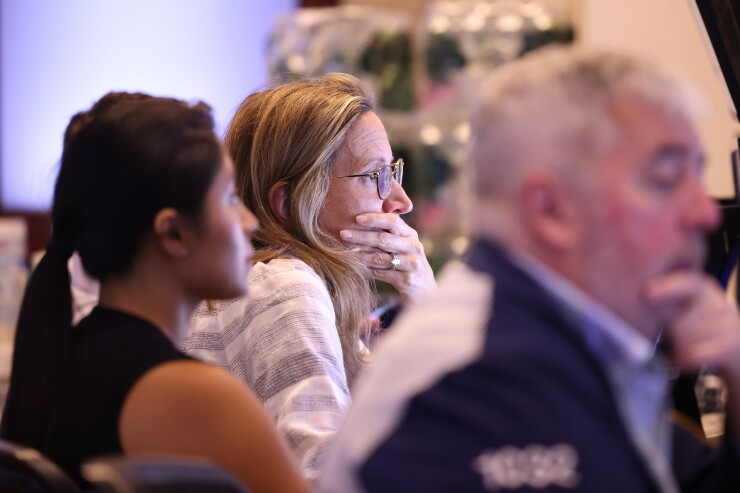(Bloomberg) -- A group of hedge-fund veterans has agreed to buy part of the risk on a loan portfolio from the Inter-American Development Bank Group, marking a rare transfer of balance-sheet exposure that could become a model to help multilateral lenders ratchet up lending.
IDB Invest, the group's private-sector arm, is transferring a chunk of risk from a $1 billion loan portfolio to investors led by Newmarket Capital, said Aaron Barnes, co-founder of Newmarket and a veteran of hedge-fund manager Mariner Investment Group. The transaction will free up as much as $500 million for loans in Latin America and the Caribbean to help alleviate poverty and protect the environment, according to a presentation of the details seen by Bloomberg.
"This is a big deal for the IDB, but more than that it is a new business model," IBD President Ilan Goldfajn said in an interview. "This is the instrument that can get us closer to the scale we need."
Multilateral lenders are under pressure to scale their operations and get maximum mileage out of their balance sheets as developing nations grapple with the combined effects of climate change and debt burdens left bloated by the Covid pandemic.
Meanwhile, there's record growth in the market for risk transfers, which allow banks to churn out more loans without denting their capital buffers. Private credit funds are the biggest buyers of SRTs, with a market share of more than 60%, according to the International Monetary Fund. Pension funds hold around 20%, the IMF estimates.
"There's now a groundswell of activity and this deal is going to kick-start more," said Molly Whitehouse, a managing director at Newmarket who also used to work at Mariner together with Barnes. Newmarket already has a third synthetic securitization for a multilateral lender in the works, and expects more to come next year, she said.
"We're at the cusp of a real sea change within how the multilaterals can do more lending and partner with the private sector," Whitehouse said.
The Details:
Under the terms of the agreement with Newmarket, IDB will retain the first 3% of losses and transfer the risk associated with the next 7% to the Philadelphia-based investment manager. A further 3% has been placed with insurers Axa SA and Axis Capital. Overall, IDB gets to alleviate 10% of mezzanine risk through the deal, with Banco Santander SA acting as structuring agent.
The deal, dubbed Scaling4Impact, falls within recommendations for MDBs set out in a G20 report focused on expanding lending capacity by about $200 billion over the coming decade. The African Development Bank was the first multilateral lender to move into the SRT market with a 2018 deal linked to a $1 billion private-sector loan portfolio to investors led by Mariner Investment Corp., where Barnes and Whitehouse worked as directors at the time. That transaction generated returns of 11% for its investors.
The deal with Newmarket forms part of IDB's new so-called originate-to-share business model. The idea is to bundle loans made to IDB's 26 member countries and across sectors, and repackage these as a standardized product for private investors.
Interest from private investors like Newmarket comes as multilateral lenders face a financing drought from government shareholders, many of which are struggling to manage their deficits. At the same time, the lenders are trying to balance their economic development mandate with the need to focus on environmental considerations, adding to pressure to boost their financial clout.
Against that backdrop, synthetic securitizations on private-sector loans "make a lot of sense, both developmentally as well as financially," said Chris Humphrey, senior research associate at think tank ODI and an adviser to the G20 on how to boost the investing capacity of multilateral development banks.
Multilateral development banks "want to go from billions to trillions" of dollars worth of impact, Whitehouse said, and the synthetic securitization with IDB is "a really elegant structure" that helps ratchet up its financing.
The IDB deal benefited from ratings agencies providing clear guidance on how to structure securitizations in order for them to be treated as a pathway to capital relief, Newmarket's Barnes said. That clarity "is going to be a game changer," he said.
Traditionally, multilateral development banks have had to maintain high levels of capital to safeguard their credit ratings — often AAA — and keep their financing costs low. Whitehouse says the IDB transaction shows private investors are willing to look at different risk structures.
"A lot of private-sector capital engagement with development lending is in the senior-rated capacity, where someone's coming in and buying the AAA notes," Whitehouse said. "It's really powerful and hopefully very catalytic to demonstrate that there is private sector capital interest at a very different risk-return profile."
(Adds reference to IMF report in fifth paragraph.)
More stories like this are available on bloomberg.com






